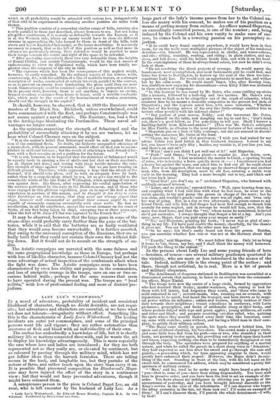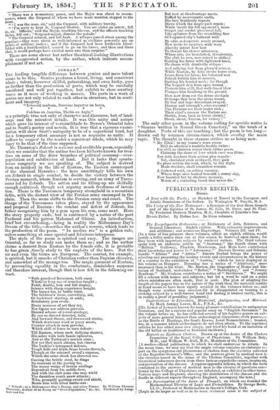LADY LEE'S WIDOWHOOD. * IN a novel of adventure, probability of
incident and consistent likelihood of character, though no doubt desirable, are not requi- site; but adventures and characters are essential, or we have what art does not tolerate—irregularity without effect. Something like this is the characteristic of Lady Lee's Widow/mood. The leading incidents are outré yet commonplace, and some of the principal persons want life and vigour; they are rather automatons than creatures of flesh and blood with an individuality of their own.
The author has undoubtedly a knowledge of life, but it is chiefly military life or matters connected therewith, and he wants the art to display his knowledge advantageously. This is more especially the case where love and ladies are introduced ; for they are both represented not as they really are, or elevated by sentiment, but as coloured by passing through the military mind, which has not got loftier ideas than the barrack furnishes. There are telling scenes in the book, and laughable too, but they partake of the nature of farce, and rather touch upon the story than carry it on. It is possible that piecemeal composition for Blackwood's Maga- zine may have injured the effect of the story in a continuous view ; but that would not haxe prevented adventures, though it might have coloured them.
A conspicuous person in the piece is Colonel Begot Lee, an old roué, who is left executor by the husband of Lady Lee. As a
• Lady Lee's Widowhood. By Edward Bruce Hamley, Captain B.A. In two volumes. Published by Blackwood and Sone. large part of the lady's income passes from her to the Colonel un- less she marry with his consent, he makes use of his position as a I means of getting money from suitors. An officer named Sloperton, an exceedingly conceited person, is one of the number ; and, being I induced by the Colonel and his own vanity to make sure of sue- ! cess, he comes back in a towering passion on his peremptory re- jection. "If he could bare found comfort anywhere, it would have been in that room, for on the walls were multiplied pictures of the object of his tenderest I devotion—viz. himself. He was represented in chalks, and water-colours, and oils- ' sitting, standing, reading, and riding; in plain clothes, and un- dress, and full dress ; with his helmet beside him, and with it on his head. In the contemplation of these he always found solace, but now he didn't even look at them.
"He sat revolving the direst projects of revenge. He would marry the handsomest, most accomplished, and moat fashionable girl he could find, and bring her down to Boddington to harrow up the soul of the then too-late- repentant Lady Lee. He would seek an opportunity to meet her, and wither her by his calm scorn. He would insult Begot, who, after fleecing him, was doubtless now enjoying his discomfiture—even Kitty Fillet was included in these schemes of vengeance. "In this humour he was found by Mr. Oates, who came rattling up-stairs like a tornado, followed by a bull-dog and two terriers. Mr. Oates's own spirits were so high as to be altogether out of the reach of calamity, which rendered him by no means a desirable companion in the present low state of Sloperton's ; and the Captain asked him, with some irritation, Whether the fact of his having nerves of his own like fiddle-strings entitled him to torture other people's with his infernal clatter ? ' " ' Beg pardon of your nerves, Nobby,' said the irreverent Mr. Oites, seating himself on the table, and dangling one leg to and fro ; don't faint yet, there's a good fellow, as I've something to tell you. Shall I borrow a smelling-bottle from Ribs-and-ankles ? ' (This was Mr. Oates's sobriquet for Miss Finkle, in allusion to the most prominent features of her anatomy.) "Sloperton put on a look of lofty contempt, but did not succeed in discon- certing the audacious Mr. Oates in the least.
"• Sloper, my boy,' said that gentleman, I wish you had waited for my advice before you paid forfeit in that Goshawk business. I stood to my bet, you know—'twas only fifty ; besides, my maxim is, if you lose you lose, and there's an end on't.'
" ' What ! don't you think I got well out of it ? ' said Sloperton.
" 'Pooh !' said Oates ; "twas a plant—a regular do. Just listen, now, how I discovered it. I had mentioned the matter to Chick, a sporting friend of mine, who is training a horse quietly down at —; I mentioned you had a heavy bet against the mare and asked him to find out all he could about her. Now it so happened, that not long ago he observed Seager and another man, who, from his description, must be old Lee, entering a stable very early in the morning. They had a mare brought out to try, and Chick saw her come back lame.'
" 'Good God! you don't say so exclaimed Sloperton, who listened with suddenly-aroused interest. " 'Lame, and no mistake,' repeated Oates. Well, upon hearing from me, and coupling what I had told him with what he had seen, he went to the stable quietly, to try and pump the groom in charge of the mare ; but he was close, and wouldn't peach—said the mare was all right, and 'twas only i
her way of going. But, n a day or two afterwards, the groom comes to my friend Chick, and tells him that Seager had been fool enough to thrash him soundly for some neglect, and in revenge he would tell him, now, that the mare was dead lame, and that the vet,' whose name he mentioned, believed she'd got navicular. I always thought that Seeger a bit of a leg. Ain't you sorry, now, Stoker, that you. paid away your money so easily ?' "'No,' said bloperton, grinding his teeth; I never was so glad of any- thing in my life. I'd have paid double the money, cheerfully, for the chance it gives me. You say he thinks the other man was Lee ?' "'So he says; but that's easily found out from the groom. Besides, you can ascertain whether Lee was or was not at the Heronry about that time.'
"'Exactly,' said Sloperton. We must follow this up. Only lotus bring it home to 'em, Oates, my boy, and I shall think the money well bestowed. I'll push the thing to the utmost.'" In the persons about Lady Lee and some young friends of hers —heroines, of course—are several Military gentlemen quartered in the vicinity, who are more or less introduced in the scenes of the tale. Indeed, military life is the strong point of the author; and there, though not artistical, he is real. Here is a bit of parade and military eloquence.
"The detachment of dragoons stationed in Doddington was assembled at a dismounted parade that morning, to listen to an oration from the command- ing officer, Major Tindal. • "The troops were now the centre of a large circle, formed by apprentices who had deserted their trades; master-workmen, who, coming to look for them with fell intent, had forgotten their wrath, and those who came to scold remained to see ' ' - servant-maids, who, running out on errands, with injunctions to be quick, had heard the trumpet, and been drawn as by magi- cal power within its influence; ostlers and waiters, utterly reckless of their duty towards their neighbour ; truant schoolboys in corduroys, with Latin grammars, geographies, and books of arithmetic slung at their backs, and whose pockets bulged with tops and green apples ; young milliners, all curls and titter and blush ; and paupers receiving out-door relief, who, quitting the spots where they usually basked away their time like lazzarom, came up, some with crutches, some without, and having a blind man in their com- pany, to satisfy their military ardour.
"The Major came slowly on parade, his hands crossed behind him, his spurs and scabbard clanking, his face stem. The crowd made a larger circle, and some little boys fled from his path—one or two, who stumbled in their haste, not pausing to rise again, but grovelling out of reach upon their hands and knees, expecting nothing else than to be immediately decapitated or run through the body. The spectators were prepared for anything of a martial nature, and when he called the parade in a short sharp voice to 'Attention," they half expected to see him draw his sword and F. through the cuts and guards,—a proceeding which, far from appearing singular to them' would greatly have enhanced their respect: However, the Major didn't do any- thing of the sort. Standing in front of the line, with his left hand on his sword-hilt, he commenced his address, which may be considered a pretty fair specimen of military oratory.
"'Men,' said he, (and as he spoke you might have heard a pin drop,)
you—that is, some of you—have been acting disgracefully. You were sent here to preserve order, and you have been the first to set an example of dis- order. You have abused my indulgence in allowing you to partake of the amusements of yesterday, and you have brought internal discredit on the King's service in the eyes of the inhabitants. If I can discover who began the affray yesterday in the fair, let them look out ! I'll make an example of them ! If I can't discover them, I'll punish the whole detachment—I will, by God! " There was a momentary pause, and the Major was about to recom- mence, when the Corporal of whom we have made mention stepped to the
front. " 'I was the man, sir,' said the Corporal, with military brevity. "'I'm sorry to hear it, Corporal Onslow. You are under an arrest; fall in sir. Officers,' said the Major, touching his cap, and the officers touching theirs, fell out ; Sergeant-major, dismiss the parade.' "The Corporal saluted, and fell back. A whisper passed about among the populace—they were about as well-informed as civilians generally are on points of military justice ; and if the Corporal had been forthwith blind- folded with a handkerchief, caused to go on his knees, and then and there shot, it would perhaps have excited more awe than surprise."
There are some clever but rather theatrical-looking illustrations with exaggerated action, by the author, which indicate accom- plishment if not art.

































 Previous page
Previous page